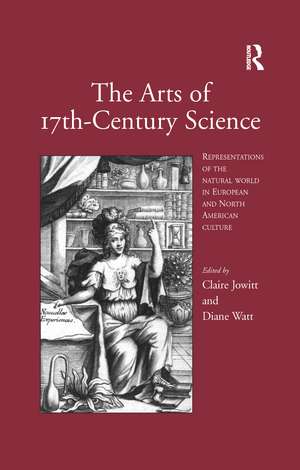The Arts of 17th-Century Science: Representations of the Natural World in European and North American Culture
Autor Claire Jowitt, Diane Watten Limba Engleză Paperback – 11 noi 2016
Preț: 338.33 lei
Preț vechi: 386.78 lei
-13% Nou
Puncte Express: 507
Preț estimativ în valută:
64.74€ • 69.23$ • 53.98£
64.74€ • 69.23$ • 53.98£
Carte tipărită la comandă
Livrare economică 17 aprilie-01 mai
Preluare comenzi: 021 569.72.76
Specificații
ISBN-13: 9781138256439
ISBN-10: 1138256439
Pagini: 288
Dimensiuni: 152 x 229 mm
Greutate: 0.45 kg
Ediția:1
Editura: Taylor & Francis
Colecția Routledge
Locul publicării:Oxford, United Kingdom
ISBN-10: 1138256439
Pagini: 288
Dimensiuni: 152 x 229 mm
Greutate: 0.45 kg
Ediția:1
Editura: Taylor & Francis
Colecția Routledge
Locul publicării:Oxford, United Kingdom
Cuprins
Contents: Introduction, Claire Jowitt and Diane Watt; The transparent man and the king's heart, Jonathan Sawday; Philosophy, Thought and Natural Knowledge: 'Things which are not': poetic and scientific attitudes to non-entities in the 17th century, Anthony R. Archdeacon; Points mean prizes: how early-modern mathematics hedged its bets between idealism and the world, Jess Edwards; Bantering with Scripture: Dr Archibald Pitcairne and articulate irreligion in late 17th-century Edinburgh, David E. Shuttleton; Religion, Politics and the Natural World: The politics of morbidity: plague symbolism in martyrdom and medical anatomy, Peter Mitchell; Restoring all things from the curse: millenarianism, alchemy, science and politics in the writings of Gerrard Winstanley, Andrew Bradstock; Providence, earth's 'treasury' and the common weal: Baconianism and metaphysics in millenarian utopian texts 1641-55, Carola Scott-Luckens; Gender, Sexuality and Scientific Thought: Journeys beyond frontiers: knowledge, subjectivity and outer space in Margaret Cavendish's The Blazing World (1666), Bronwen Price; Gender, science and midwifery: Jane Sharp, The Midwives Book (1671), Elaine Hobby; The masculine matrix: male births and the scientific imagination in early modern England, Ruth Gilbert; From nymph to nymphomania: 'linear perspectives' on female sexuality, Bettina Mathes; New Worlds and New Philosophies: Thomas Harriot and John White: Ethnography and ideology in the New World, Andrew Hadfield; 'Adding to the world': colonial adventure and anxiety in the writings of John Donne, Richard Sugg; Alternative planet: Kepler's Somnium (1634) and the New World, Mary Baine Campbell; Bibliography; Index.
Recenzii
'The editors should be commended for their excellent editing.' Seventeenth-Century News
Descriere
Contemporary ideals of science representing disinterested and objective fields of investigation have their origins in the seventeenth century. However, 'new science' did not simply or uniformly replace earlier beliefs about the workings of the natural world, but entered into competition with them. It is this complex process of competition and negotiation concerning ways of seeing the natural world that is charted by the essays in this book. The collection traces the many overlaps between 'literary' and 'scientific' discourses as writers in this period attempted both to understand imaginatively and empirically the workings of the natural world, and shows that a discrete separation between such discourses and spheres is untenable.
